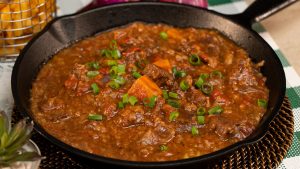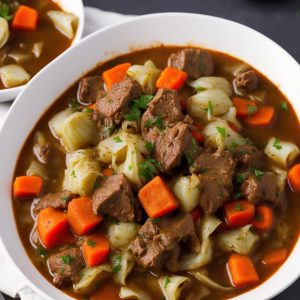This easy beef stew recipe is perfect for a cozy weeknight dinner. It features tender chunks of beef simmered in a rich and savory broth with potatoes, carrots, and celery. A touch of red wine and tomato paste adds depth to the flavor, making it a comforting dish that's sure to satisfy.
Photos of Easy Beef Stew Recipe
If you're not familiar with cooking stews, you might need to pick up a couple of special items. Stewing beef is a specific cut that's perfect for slow cooking, becoming tender over time. Red wine adds a rich flavor but is easily found in the wine or cooking aisle. Tomato paste is a concentrated form of tomatoes, usually found in small cans. Make sure to get cornstarch for thickening the stew.
Ingredients for Easy Beef Stew Recipe
Stewing beef: This cut is ideal for slow cooking and becomes very tender.
Flour: Used to coat the beef, helping to brown it and thicken the stew.
Garlic powder: Adds a subtle garlic flavor without the hassle of chopping fresh garlic.
Salt: Essential for seasoning and bringing out the flavors of all ingredients.
Black pepper: Adds a bit of heat and depth to the taste.
Olive oil: Used for browning the beef and onions, contributing to the stew’s rich flavor.
Onion: Adds sweetness and depth to the stew as it cooks down.
Beef broth: Forms the base of the stew, adding savory depth.
Red wine: Enhances the flavor with a touch of acidity and richness.
Potatoes: Provide substance and texture, making the stew heartier.
Carrots: Add a natural sweetness and color to the dish.
Celery: Brings a subtle crunch and flavor to the stew.
Tomato paste: Adds concentrated tomato flavor and a bit of acidity.
Dried rosemary: Provides an earthy, aromatic note to the stew.
Cornstarch: Used to thicken the stew for a heartier consistency.
Water: Mixed with cornstarch to create a slurry for thickening.
Peas: Added at the end to provide a pop of color and a bit of sweetness.
One reader, Caitrin Daley says:





This easy beef stew recipe is fantastic! The beef turns out tender, and the flavors meld beautifully. The addition of red wine adds a lovely depth. Perfect for a cozy dinner.
Techniques Required for Making Easy Beef Stew
How to brown meat: Browning meat involves cooking it at a high temperature until the surface turns brown. This process enhances the flavor through caramelization and the Maillard reaction. How to create a slurry: A slurry is made by mixing equal parts cornstarch and water. This mixture is then added to a hot liquid to thicken it. How to simmer: Simmering involves cooking a liquid just below its boiling point, where small bubbles occasionally rise to the surface. This technique is used to tenderize meat and meld flavors without overcooking.
How To Make Easy Beef Stew
This beef stew will be your next go-to comfort food. It’s made with tender beef, potatoes, and carrots in a perfectly seasoned broth.
Serves:
Ingredients
- 2lbsstewing beef,trimmed and cubed
- 3tbspflour
- ½tspgarlic powder
- ½tspsalt
- ½tspblack pepper
- 3tbspolive oil
- 1onion,chopped
- 6cupsbeef broth
- ½cupred wine,optional
- 1lbpotatoes,peeled and cubed
- 4carrots,cut into 1-inch pieces
- 4stalks celery,cut into 1-inch pieces
- 3tbsptomato paste
- 1tspdried rosemary,or 1 sprig fresh
- 2tbspcornstarch
- 2tbspwater
- ¾cuppeas
Instructions
-
Combine flour, garlic powder, and salt and pepper. Toss beef in flour mixture.
-
Heat olive oil in a large Dutch oven or pot. Cook the beef and onions until browned.
-
Add beef broth and red wine while scraping up any brown bits in the pan.
-
Stir in all remaining ingredients except for peas, cornstarch, and water. Reduce heat to medium-low, cover, and simmer for 1 to 1½ hours or until beef is tender.
-
Mix equal parts of cornstarch and water to create a slurry. Slowly add the slurry to the boiling stew to reach desired consistency.
-
Stir in peas and simmer for 5 to 10 minutes before serving. Season with salt and pepper to taste.
Nutrition
- Calories: 329.49kcal
- Fat: 11.00g
- Saturated Fat: 3.09g
- Trans Fat: 0.28g
- Monounsaturated Fat: 6.65g
- Polyunsaturated Fat: 1.03g
- Carbohydrates: 25.07g
- Fiber: 3.85g
- Sugar: 5.40g
- Protein: 31.20g
- Cholesterol: 71.44mg
- Sodium: 681.78mg
- Calcium: 67.95mg
- Potassium: 1289.20mg
- Iron: 4.05mg
- Vitamin A: 271.35µg
- Vitamin C: 21.59mg
Technique Tip for Making Easy Beef Stew
For a richer flavor, sear the stewing beef in batches to ensure each piece gets a nice crust. Overcrowding the pot can cause the meat to steam instead of brown, which can affect the depth of flavor in your beef stew.
Time-Saving Tips for Making Beef Stew
Prep ingredients ahead: Chop onions, potatoes, carrots, and celery the night before to save time.
Use pre-cut beef: Purchase pre-cut stewing beef to skip the cutting step.
Instant pot option: Use an Instant Pot to reduce cooking time significantly.
Frozen peas: Use frozen peas to avoid extra prep work.
Batch cooking: Double the recipe and freeze half for a quick meal later.
Pre-mixed spices: Combine garlic powder, salt, and pepper in advance.
Ready-made broth: Use store-bought beef broth to save time.
Substitute Ingredients For Easy Beef Stew Recipe
stewing beef - Substitute with chuck roast: Chuck roast is a well-marbled cut that becomes tender and flavorful when slow-cooked, making it an excellent substitute for stewing beef.
flour - Substitute with cornstarch: Cornstarch can be used as a thickening agent just like flour, and it will also make the stew gluten-free.
garlic powder - Substitute with fresh garlic: Fresh garlic provides a more robust and aromatic flavor compared to garlic powder.
salt - Substitute with soy sauce: Soy sauce can add a depth of umami flavor along with the necessary saltiness.
black pepper - Substitute with white pepper: White pepper has a slightly different flavor profile but can still provide the necessary heat and spice.
olive oil - Substitute with canola oil: Canola oil has a neutral flavor and a high smoke point, making it a good alternative for browning meat.
onion - Substitute with shallots: Shallots have a milder and sweeter flavor, which can add a subtle complexity to the stew.
beef broth - Substitute with chicken broth: Chicken broth can be used if beef broth is unavailable, though it will have a lighter flavor.
red wine - Substitute with balsamic vinegar: Balsamic vinegar can add acidity and a touch of sweetness, similar to red wine.
potatoes - Substitute with sweet potatoes: Sweet potatoes offer a different texture and a hint of sweetness, which can complement the savory elements of the stew.
carrots - Substitute with parsnips: Parsnips have a similar texture to carrots but offer a slightly sweeter and earthier flavor.
celery - Substitute with fennel: Fennel adds a slight anise flavor, which can add a unique twist to the stew.
tomato paste - Substitute with crushed tomatoes: Crushed tomatoes can provide a similar depth of flavor and thickness, though the texture will be slightly different.
dried rosemary - Substitute with dried thyme: Dried thyme has a similar earthy and aromatic profile, making it a good alternative to rosemary.
cornstarch - Substitute with arrowroot powder: Arrowroot powder is a great thickening agent and is also gluten-free, similar to cornstarch.
water - Substitute with vegetable broth: Vegetable broth can add extra flavor compared to plain water.
peas - Substitute with green beans: Green beans can add a similar pop of color and a slightly different but complementary texture to the stew.
Best Way to Present Beef Stew
Serve in a shallow, wide bowl: This allows the beef stew to be the star of the presentation, giving it a rustic yet refined look.
Garnish with fresh herbs: Sprinkle finely chopped parsley or thyme over the top to add a pop of color and a hint of freshness.
Use a ring mold for the stew: Place a ring mold in the center of the bowl and fill it with the stew. Carefully lift the mold to create a neat, cylindrical shape.
Arrange vegetables artfully: Position the potatoes, carrots, and celery around the beef in a visually appealing manner, ensuring each piece is evenly spaced.
Drizzle with a reduction: Reduce some of the beef broth and red wine mixture to a thick, glossy sauce. Drizzle it around the edge of the stew for added depth and elegance.
Add a touch of luxury: Place a small dollop of truffle oil or a shaving of black truffle on top of the stew to elevate the dish to a Michelin-star level.
Serve with a side of crusty bread: Present a slice of artisan bread on a separate plate, lightly toasted and brushed with olive oil, to complement the rich flavors of the stew.
Finish with a microgreen garnish: Add a few sprigs of microgreens on top of the stew for a final touch of sophistication and a burst of freshness.
Essential Tools for Making Beef Stew
Dutch oven: A heavy-duty pot with a tight-fitting lid, perfect for browning meat and slow-cooking stews.
Knife: Essential for chopping onions, potatoes, carrots, and celery.
Cutting board: Provides a safe surface for cutting vegetables and meat.
Measuring spoons: Used to measure out the flour, garlic powder, salt, pepper, and cornstarch accurately.
Measuring cups: Necessary for measuring the beef broth, red wine, and water.
Wooden spoon: Ideal for stirring the stew and scraping up brown bits from the bottom of the pot.
Mixing bowl: Used to combine the flour, garlic powder, salt, and pepper for tossing the beef.
Tongs: Handy for turning the beef while browning it in the pot.
Ladle: Useful for serving the stew once it's ready.
Small bowl: Needed to mix the cornstarch and water to create a slurry.
Peeler: Helps in peeling the potatoes and carrots efficiently.
Can opener: If your tomato paste comes in a can, this tool will be necessary.
Timer: Useful for keeping track of the simmering time to ensure the beef becomes tender.
How To Store and Freeze Beef Stew
Let the beef stew cool completely before storing or freezing. This will prevent condensation from forming and diluting the flavors.
To store in the refrigerator, transfer the cooled stew to an airtight container. It will keep well for up to 4 days in the fridge.
For longer storage, freeze the beef stew:
- Divide the cooled stew into portion-sized freezer-safe containers or resealable bags, leaving some space at the top for expansion during freezing.
- Label the containers or bags with the date and contents.
- Place the containers or bags in the freezer, laying them flat for even freezing.
- Beef stew can be frozen for up to 3 months.
To reheat frozen beef stew:
- Thaw the frozen stew overnight in the refrigerator.
- Transfer the thawed stew to a pot and heat it gently over medium-low heat, stirring occasionally, until it's heated through.
- If the stew appears too thick after thawing, add a little beef broth or water to achieve the desired consistency.
- Taste and adjust the seasoning if needed before serving.
Note: Potatoes in the stew may become slightly soft and grainy after freezing and reheating, but the overall flavor of the dish will remain delicious.
How To Reheat Beef Stew Leftovers
Stovetop method: transfer the leftover beef stew to a pot and reheat it over medium-low heat, stirring occasionally until it's heated through. This method allows you to control the temperature and prevent the stew from burning or drying out. If the stew appears too thick, add a splash of beef broth or water to thin it out.
Microwave method: place the desired portion of beef stew in a microwave-safe bowl and cover it with a damp paper towel or a microwave-safe lid. Heat the stew in 1-minute intervals, stirring between each interval, until it's heated through. Be careful not to overheat the stew, as it may cause the meat to become tough and the vegetables to turn mushy.
Oven method: preheat the oven to 350°F (175°C). Transfer the leftover beef stew to an oven-safe dish and cover it with a lid or aluminum foil. Place the dish in the preheated oven and reheat for 20-30 minutes, or until the stew is heated through. Stir the stew occasionally to ensure even heating and prevent the top layer from drying out.
Slow cooker method: if you have a slow cooker or crockpot, you can use it to reheat your leftover beef stew. Transfer the stew to the slow cooker and set it on low heat. Allow the stew to reheat for 1-2 hours, or until it's heated through. This method is ideal if you want to reheat a large portion of stew or if you want to keep the stew warm for an extended period.
Regardless of the reheating method you choose, be sure to stir the beef stew occasionally to promote even heating and prevent scorching. Also, ensure that the stew reaches a safe internal temperature of 165°F (74°C) before serving to minimize the risk of foodborne illness.
Random Fact About Beef Stew
A random fact about this beef stew recipe is that the addition of red wine not only enhances the flavor but also helps to tenderize the beef during the cooking process.
Is This Beef Stew Recipe Economical for Home Cooking?
This easy beef stew recipe is quite cost-effective for a household. Using stewing beef and basic pantry staples like potatoes, carrots, and celery, it maximizes flavor without breaking the bank. The inclusion of beef broth and a splash of red wine adds depth without significantly increasing costs. Overall, I would rate this recipe an 8 out of 10 for cost-effectiveness. The approximate cost for a household of 4 people is around $20-$25 USD, making it a hearty and economical choice for family meals.
Is This Beef Stew Recipe Healthy or Unhealthy?
This beef stew recipe has both healthy and unhealthy aspects. On the positive side, it includes a variety of nutritious vegetables like potatoes, carrots, celery, and peas, which provide essential vitamins, minerals, and fiber. The use of lean stewing beef is also a good source of protein. However, the recipe also has some drawbacks from a health perspective. The use of flour as a thickener and the addition of red wine and cornstarch can increase the carbohydrate and calorie content of the dish. Additionally, the recipe does not specify the use of low-sodium beef broth, which could lead to a higher sodium content.
To make this recipe healthier, consider the following suggestions:
- Use whole wheat flour instead of all-purpose flour to increase the fiber content
- Opt for low-sodium beef broth to reduce the overall sodium content of the dish
- Increase the variety and quantity of vegetables to boost the nutritional value
- Use a leaner cut of beef, such as sirloin or round, to reduce the fat content
- Replace the red wine with additional beef broth or a non-alcoholic alternative to lower the calorie count
- Experiment with different herbs and spices, such as thyme or paprika, to add flavor without relying on salt
Editor's Thoughts on This Beef Stew Recipe
This beef stew recipe is a comforting classic with a well-balanced blend of flavors. The use of red wine adds depth, while the tomato paste and rosemary provide a rich, aromatic base. The cornstarch slurry ensures a perfect consistency, and the addition of peas at the end maintains their vibrant color and texture. It's straightforward yet delivers a hearty, satisfying meal. However, consider browning the beef in batches to avoid overcrowding the pot, ensuring even caramelization. Overall, it's a reliable and flavorful dish suitable for both novice and experienced cooks.
Enhance Your Easy Beef Stew Recipe with These Unique Side Dishes:
Other Alternative Recipes Similar to Beef Stew
Suggested Appetizers and Desserts to Serve with Beef Stew
Why trust this Easy Beef Stew Recipe:
This easy beef stew recipe is a tried-and-true classic that promises hearty and comforting flavors. The combination of tender stewing beef, rich beef broth, and a splash of red wine creates a depth of flavor that is hard to beat. With the addition of potatoes, carrots, and celery, this stew is not only delicious but also nutritious. The final touch of peas adds a pop of color and sweetness. Trust this recipe for its simplicity and the wholesome, satisfying meal it delivers every time.
Was this page helpful?
Have your own special recipe to share? Submit Your Recipe Today!











